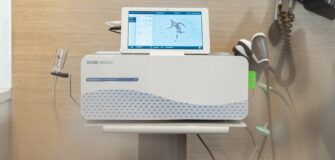How ASA/NATA accreditation has improved patient outcomes in 10 years
Share
The ASA/NATA celebrates 10 years of the Sleep Disorder Services accreditation program helping Australians sleep better.
The National Association of Testing Authorities (NATA) together with the Australasian Sleep Association (ASA) celebrate 10 years of the Sleep Disorder Services (SDS) accreditation program which has been helping Australians sleep better.
The program helps Australians who suffer from sleep disorders, such as obstructive sleep apnoea, which can cause significant health risks and impacts one in 10 people across the country. There are several treatments including weight loss, reduction in alcohol and dental services according to Sleep Health Foundation.
The goal is to ensure sleep service providers meet the required standards of operational practice so that patients receive the most appropriate care.
The ASA/NATA SDS accreditation assesses sleep services against the ASA Standard providing business and patient outcomes that matter. The accreditation program covers sleep studies conducted in laboratories as well as home-based.
Speaking at Sleep DownUnder in Brisbane, Deputy Sector Manager and founding lead of the accreditation program, Tracy Fleming said patient outcomes had improved markedly as a result of the growth and expansion of the program.
“When we started a decade ago we had a few committed labs interested in becoming accredited and today it’s well over 100. The past 10 years have seen substantial growth in the sector, and as we see more labs gain accreditation we look forward to seeing more patients benefit from care delivered in accordance with the requirements of the ASA Standard,” Fleming said.
Mitigating risk is a key benefit of accreditation according to Tom Churchward, who was one the first Australian Accredited Clinical Physiologists and is currently Head Scientist, Department of Respiratory & Sleep Medicine of Austin Health.
When asked about how his organisation gained its ASA/NATA SDS accreditation, he commented: “We found the process straightforward, and we were able to gain accreditation within three months following the initial assessment.
“We view accreditation as a badge of honour which recognises the competence of our organisation which we can show off to our patients and peers alike, I know our patients value the confidence that it brings. At Austin Health we know that accreditation goes a long way to mitigating risk for the business, so our operations team sleep a little easier at night as well,” Churchward said.
Also speaking on a panel was Professor John Wheatley, who sits on the Accreditation Advisory Committee and is the Director of the Department of Respiratory and Sleep Medicine at Westmead hospital.
He noted that: “As part of the joint accreditation partnership, ASA is responsible for maintaining the international standard and clinical guidelines. NATA is responsible for the administration and operation of the accreditation program itself. As part of the assessment process, NATA engages subject matter experts known as Technical Assessors that work with NATA Lead Assessors to undertake a peer review as part of the assessment, ensuring a rigorous process”.
NATA Accreditation Specialist, Brodie Quine also spoke to attendees on key ‘tips’ to consider when planning for the assessment process. She also highlighted that the types of labs seeking accreditation have changed since the start of the program.
“While our initial accredited facilities were typically tertiary (public) hospitals, we’re seeing a greater move to private services that are also seeking to ensure studies are carried out to the highest industry standard and seek better outcomes for their patients and their businesses.”
Content from ASA/NATA media release. Note: Content has been edited for style and length.
Ritchelle is a Content Producer for Healthcare Channel, Australia’s premier resource of information for healthcare.




